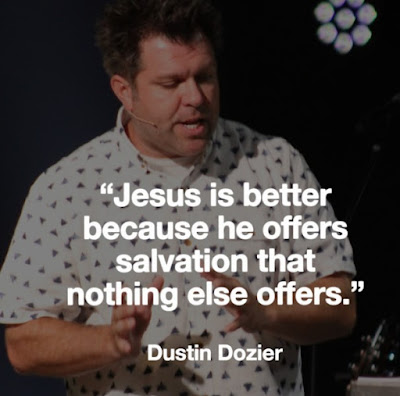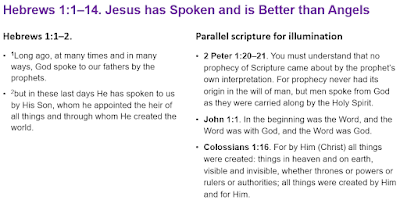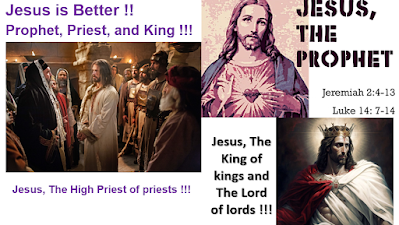Jesus is Better - Hebrews
Today we start a new series in the book of Hebrews where we will be discovering a life changing truth, Jesus is Better.
Better than what you ask? Just fill in the blank!
Jesus is better than anything and everything this world has to offer. Lean into this study and you will see how Jesus is far better than you can imagine.
The Point
The path
to a deeper relationship with Jesus starts and ends by staying connected to
Jesus.
Hebrews 1:1-14
The Supremacy of
God’s Son
1 Long ago, at many
times and in many ways, God spoke to our fathers by the prophets, 2 but in
these last days he has spoken to us by his Son, whom he appointed the heir of
all things, through whom also he created the world. 3 He is the radiance of the
glory of God and the exact imprint of his nature, and he upholds the universe
by the word of his power. After making purification for sins, he sat down at
the right hand of the Majesty on high, 4 having become as much superior to
angels as the name he has inherited is more excellent than theirs. 5 For to
which of the angels did God ever say, “You are my Son, today I have begotten
you”? Or again, “I will be to him a father, and he shall be to me a son”? 6 And
again, when he brings the firstborn into the world, he says, “Let all God’s
angels worship him.” 7 Of the angels he says, “He makes his angels winds, and
his ministers a flame of fire.” 8 But of the Son he says, “Your throne, O God,
is forever and ever, the scepter of uprightness is the scepter of your kingdom.
9 You have loved
righteousness and hated wickedness; therefore God, your God, has anointed you
with the oil of gladness beyond your companions.” 10 And, “You, Lord, laid the
foundation of the earth in the beginning, and the heavens are the work of your
hands; 11 they will perish, but you remain; they will all wear out like a
garment, 12 like a robe you will roll them up, like a garment they will be
changed. But you are the same, and your years will have no end.” 13 And to
which of the angels has he ever said, “Sit at my right hand until I make your
enemies a footstool for your feet”? 14 Are they not all ministering spirits
sent out to serve for the sake of those who are to inherit salvation?
The Holy Bible:
English Standard Version (Wheaton, IL: Crossway Bibles, 2016), Heb 1:1–14.
Study
Notes
A PRIMER FOR HEBREWS
“You ain’t never
met nobody like Jesus.”
- Charlie Dates
“There is a way to
hell even from the gates of heaven!”
- John Bunyan
The message of
Hebrews is clear and often repeated in the letter’s 13 chapters: Jesus is
better, and we need to stay close to Him!
Hebrews is written
to Jewish Christians to remind them of the supremacy of Christ and to warn them
to never drift away from Christ to other lesser things, whether worldly or
religious.
CONTEXT
Who Wrote It?
This question is
often asked in relation to Hebrews, but it’s never answered. There are three
basic options for authorship.
Option 1: Paul—The
oldest church tradition is that Hebrews was written by Paul. There are severe
obstacles to considering Paul the author.
• Anonymity. Paul’s
custom is to introduce his letters.
• Experience. The
conversion experience of the author of Hebrews seems to be more subtle than
Paul’s drastic experience. Paul’s conversion usually makes some sort of appearance
in his other epistles.
(This author seems
to have had no personal experience with God but had the message “attested” to
him.)
• The Early Church.
As far back as Origen (3rd century Christian scholar) noted drastic differences
between Paul’s epistles and Hebrews.
Option 2: Luke -
There are theological and grammatical similarities between Luke’s other
writings and the epistle to the Hebrews.
Option 3: Apollos,
Barnabas, or another disciple of Paul.
Ultimately, we must
concede that the author of Hebrews is unknown because God wishes for this
person to remain anonymous. However, without question, Hebrews was considered
canonical because of its connection with the Apostle Paul.
To Whom Was It
Written?
Hebrews is written
specifically to the Christians who had Jewish backgrounds.
Beyond this, it’s impossible to know the specific Jewish community this letter targeted. In more modern times, it is believed Hebrews may have been addressed to a more diverse audience of Jews and Gentiles. Support for this view lies in the fact that the Old Testament was the Bible of the early church and early Gentile believers could have faced the pressure to integrate Jewish religious practices into their new Christian identity.
When Was It
Written?
Most consider the
letter had to have been written before AD 70 due to its lack of mentioning the
destruction of the temple, an occurrence that would have surely been mentioned
due to the strong Jewish allusions in the text.
Why Was It Written?
Hebrews is written
to warn Christians not to drift from the faith. Whether the audience is Gentile
or Jewish, Hebrews is written as an argument for the supremacy of Christ and to
warn any audience not to drift from the supreme Savior.
As one commentator
makes clear, Hebrews “challenges believers to go on to maturity and not to
waver in their faith.”
What Style Was It
Written? (Genre)
Hebrews is an
epistle, but it is different from any other epistle in that it’s essentially a
sermon of the early church, sent as a letter.
WEEK 1 NOTES:
Hebrews 1:1-14
Christianity is
full of staggering, world-altering, life-changing truths. Sadly, there are
times when Christians take these big truths for granted because we’ve become so
familiar with them. Hebrews is meant to shake us from our familiarity and make
us worship God in a fresh way.
As we read the very
first verses of Hebrews we are introduced to the first of the letters’ big
truths. GOD SPEAKS.
In the 17th and
18th centuries Deism was a popular belief among many intellectuals. Deists
believed there was a God who created the world and set history in motion, but
after getting things started He stepped back from all human affairs. Simply
put, God created the car but then He took his hands off the wheel and exited
the driver’s seat. Hebrews Chapter 1 clearly refutes this idea. We do not have
a God who has abandoned us. We have a God Who is intimately involved in the
affairs of mankind. God is so involved in our affairs He speaks to us.
There is a
progression to God’s speech to us. Previously, He spoke to the prophets. We
have a record of the things He spoke to our ancestors in the faith, we call
this revelation the Old Testament. However, God was not content to reveal
Himself in words alone. Instead, the God of all creation came to us in human
form as Jesus Christ.
Jesus Christ is the
Word of God.
When God wanted to
give us a final word, a word that would never need addition or clarification,
He spoke to us through Jesus Christ. The author of Hebrews says Jesus is the
final word for two reasons. First, Jesus is the final word because Jesus is the
final authority. God the Father has appointed Christ as the heir of all things.
That means everything in this world, seen and unseen, stuff that’s yours and
stuff that’s mine, actually belongs to Jesus. It’s His stuff. This is His
world. He’s in charge.
So, we don’t need a
second opinion on anything. What Jesus says is sufficient for any question we
come across in life. Jesus is the final word because He’s the final authority.
Secondly, Jesus is
the final word because He is the final revelation of God. God has revealed
Himself in many ways in the course of scripture. God revealed Himself as a
pillar of smoke to Abraham when He made Covenant with Abraham. He revealed
Himself in a burning bush to Moses when He called Moses to liberate the people
of Israel. He revealed Himself as a cloud of smoke and a cloud of fire when He
guided the Israelites into the promised land. Every revelation prior to Jesus
was a dress rehearsal though. In Christ, we have the full and final revelation
of God to the people of God. Jesus is the exact imprint of God. Look at Jesus
and you see God. Jesus is the final word because He is the final Revelation.
Jesus Is the Son of
God.
When Jesus speaks
to us as the Word of God, the final authority and the final revelation of God,
He has every right to do so because He is the son of God. The author of Hebrews
makes clear that Jesus is not like other beings. He is not like human beings.
He is not even like heavenly beings. He is higher than even the angels. He is a
creator not a creature. He is the Son of God, not a creation of God. While that
may be confusing, it is a major theme in the book of Hebrews. Jesus is God the
Son, the second person of the Trinity. Because of Who Jesus is, the Son of God,
we don’t need other sources of revelation or authority, we don’t need other
heavenly experiences, or some other form of heavenly wisdom. Jesus is all we
need. Jesus is the Son of God.
QUESTIONS
FOR DISCUSSION
Why is the Old Testament
important if we know Jesus Christ is the final Word that God has for his
people?
How can we know God
is speaking to us if Jesus is His final world to His people?
In your own words,
how would you explain the Trinity to someone? Why is it important to hold on to
the Trinity even if it’s confusing at times?
Why is it so often
easy to drift away from God even when He has spoken clearly to us through Jesus
Christ?
How can we live so
we can be sure to hear God when He is speaking to us?
END
Teacher Notes: (Brent Egan)

















